
Unfriending Facebook? Internet giants and their earnings
As Facebook makes stock market history, we examine the concentration of big profits in a handful of companies.
Internet giants Facebook, Amazon and Google’s parent company, Alphabet, have published their quarterly earnings reports this week.
Alphabet earned $32.7bn in revenue in the past three months, with Google churning out extraordinary amounts of profit. Alphabet reported net income of $3.2bn. Without the antitrust battle with EU regulators over Google’s Android mobile software, which led to a five billion dollar fine for the quarter, it would have been $8.3bn, the company said.
Keep reading
list of 4 itemsA flash flood and a quiet sale highlight India’s Sikkim’s hydro problems
Why is Germany maintaining economic ties with China?
Behind India’s Manipur conflict: A tale of drugs, armed groups and politics
Facebook profits were up 31 percent over last year, but they shocked investors, forecasting slowing revenues. As a result, Facebook saw about $119bn wiped off its stock market value – which is the largest one-day loss for any company in US stock market history.
E-commerce giant Amazon topped $2bn in quarterly profit for the first time in its history.
Part of the reason these companies are so profitable is because the world’s digital population keeps growing. Because the internet has gone mobile, more people in 2018 have access to the internet than safe drinking water.
Anyone born after 1985 is considered a “digital native” and can’t imagine a time before the internet. As of July this year, 4.1 billion people were active internet users and 3.3 billion were social media users.
Every minute, 38 million messages are passed between various individuals on WhatsApp. There are 3.7 million search queries on Google. And every minute, $862,823 is spent online.
According to the World Bank, developed economies still dominate the spread of knowledge and information. And there’s concern that the world is not reaping the so-called “digital dividends” of this transformation.
“Given their power in the digital sector … these companies have a special responsibility to act fairly and not to infringe competition,” says Alasdair Reid, principal researcher and Policy Director at the European Future Innovation System Centre.
Asked whether 2018 could be a decisive year for Facebook, Reid explains that “Facebook has been particularly hard hit by some of the concerns that have arisen over the different scandals … the access of data and the use of that data related to elections.
“The younger generations are also looking for other tools and moving to other apps and platforms. So there is a natural trend linked to the hit that they have taken from the privacy abuses that have taken place … Is it the peak of Facebook? Well, I am not sure that’s the case, I think they’re in a very strong position. But it’s a very good example for where there is a need for clear regulation and checks on the use of the data that’s collected by such a company.”
But Reid believes that overall there are “huge benefits for us. I think the internet … the future applications of artificial intelligence, these are all things that should be enablers for a better society and not only about making profit. We have to get that balance right in the future.”
Ocean diamonds: Africa’s ‘blue economy’
Africa’s “blue world” is made up of vast lakes, oceans and rivers. The African Union (AU) calls the “blue economy” the “New Frontier of African Renaissance” and there’s been a lot of talk and forums focusing on it over the past year.
We really need to transform the way sectors and countries plan among each other, and also appreciation by the economic and corporate powers that the value is generated from ecosystems or assets that can be damaged. You need to manage them sustainably, just like you manage a hedge fund ... so you don't destroy it while you are exploiting it.
Thirty-eight of Africa’s 54 states are coastal. The island nation of Mauritius, for example, is one of the smallest countries in the world. But it has territorial waters the size of South Africa, and lying on the ocean bed are potential sources of metals, minerals, and oil and gas.
While the blue economy has the capacity to provide desperately needed jobs, the challenge is all about how to exploit water resources in a sustainable way. As efforts get under way to exploit the continent’s ocean ecosystem, environmentalists are warning more research is required to shape policies.
So what’s behind the “blue economy” concept? Is it more than just the rebranding of marine exploitation?
“The blue economy is about using and utilising ocean resources sustainably, without damaging it … It’s problematic but it’s still a long time into the future,” says Dr David Obura, the director of Coastal Oceans Research and Development in the Indian Ocean (CORDIO), East Africa.
“You need to manage them sustainably, just like you manage a hedge fund … so you don’t destroy it while you are exploiting it.”
Also on this episode of Counting the Cost:
Industrial whaling: The commercial hunting of fin whales is in the spotlight in Iceland after the death of a rare mixed breed. Nick Clark reports.
Cementing the BRICS: The Chinese president says there will be no winners in a global trade war. He is urging unity among BRICS nations – pushing emerging economies for closer ties to offset Trump’s protectionism. Haru Mutasa reports from Johannesburg.
Brazil innovation and technology: As the world becomes less homogeneous and less Western, Brazilian innovators and engineers are hoping that advances in their country’s technology industry can help solve many of the development problems encountered by emerging nations. Daniel Schweimler reports.